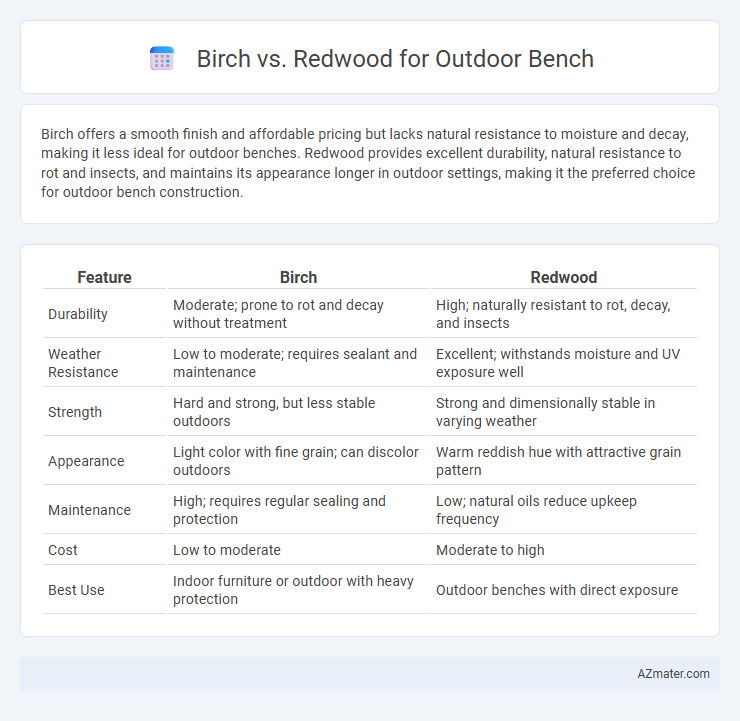Birch offers a smooth finish and affordable pricing but lacks natural resistance to moisture and decay, making it less ideal for outdoor benches. Redwood provides excellent durability, natural resistance to rot and insects, and maintains its appearance longer in outdoor settings, making it the preferred choice for outdoor bench construction.
Table of Comparison
| Feature | Birch | Redwood |
|---|---|---|
| Durability | Moderate; prone to rot and decay without treatment | High; naturally resistant to rot, decay, and insects |
| Weather Resistance | Low to moderate; requires sealant and maintenance | Excellent; withstands moisture and UV exposure well |
| Strength | Hard and strong, but less stable outdoors | Strong and dimensionally stable in varying weather |
| Appearance | Light color with fine grain; can discolor outdoors | Warm reddish hue with attractive grain pattern |
| Maintenance | High; requires regular sealing and protection | Low; natural oils reduce upkeep frequency |
| Cost | Low to moderate | Moderate to high |
| Best Use | Indoor furniture or outdoor with heavy protection | Outdoor benches with direct exposure |
Birch vs Redwood: An Overview
Birch offers a dense, fine grain with moderate durability, making it a budget-friendly option for outdoor benches but requiring regular sealing to prevent moisture damage. Redwood, known for its natural resistance to decay and insects due to high tannin content, tends to last longer in outdoor settings with minimal maintenance. Choosing between Birch and Redwood depends on balancing cost, longevity, and upkeep for outdoor applications.
Durability of Birch and Redwood Benches
Birch benches offer moderate durability with a fine grain and a smooth finish but are more susceptible to moisture damage and decay when used outdoors without proper sealing. Redwood benches exhibit superior durability, naturally containing tannins and oils that resist rot, insects, and weathering, making them ideal for outdoor environments. While birch requires frequent maintenance to maintain its integrity, redwood provides long-lasting strength and resilience in harsh weather conditions.
Weather Resistance: Which Performs Better?
Redwood outperforms birch in weather resistance, making it a superior choice for outdoor bench construction due to its natural oils and tannins that resist moisture, decay, and insect damage. Birch, while strong and attractive, is more prone to warping and rotting when exposed to harsh weather conditions without proper sealing and maintenance. For longevity in outdoor environments, redwood provides a durable, low-maintenance option that withstands rain, sun, and temperature fluctuations better than birch.
Maintenance Requirements Compared
Birch requires regular sealing and staining to protect against moisture and prevent warping, making its maintenance moderately intensive for outdoor bench use. Redwood naturally resists decay and insect damage due to its high tannin content, reducing the need for frequent treatments and offering easier upkeep. Choosing redwood minimizes long-term maintenance efforts compared to birch, especially in wet or humid climates.
Aesthetic Differences: Color and Grain
Birch showcases a pale, creamy color with fine, uniform grain patterns that provide a smooth and modern aesthetic for outdoor benches. Redwood features a rich, reddish-brown hue with pronounced, wavy grain lines, offering a warm, rustic appearance that deepens with weather exposure. The contrasting color palettes and grain textures of birch and redwood significantly influence the visual appeal and style of outdoor furniture.
Cost Analysis: Birch vs Redwood
Birch outdoor benches typically cost less upfront than redwood due to the wood's widespread availability and faster growth rate, making it a budget-friendly option for many homeowners. Redwood commands a higher price point because of its natural resistance to decay, insect damage, and its premium durability, which can reduce long-term maintenance expenses. Evaluating total cost of ownership, redwood benches often justify the initial investment through longevity and minimal upkeep, while birch may require more frequent repairs or replacement, increasing overall expense over time.
Environmental Impact and Sustainability
Birch is a fast-growing hardwood that offers moderate durability and lower environmental impact due to its rapid regeneration and widespread availability. Redwood, known for its natural resistance to decay and insects, provides long-lasting outdoor benches but is sourced primarily from old-growth forests, raising sustainability concerns. Choosing birch supports more sustainable forestry practices and reduces carbon footprint, while redwood benches prioritize longevity but may contribute to habitat loss if not sustainably harvested.
Comfort and Suitability for Seating
Birch offers a smooth texture and moderate hardness, providing firm yet comfortable seating for outdoor benches. Redwood, known for its natural durability and resistance to moisture, maintains comfort over time by minimizing warping and splintering. Both woods suit outdoor benches, but redwood's resilience makes it especially ideal for long-lasting comfort in varying weather conditions.
Longevity and Value Over Time
Birch outdoor benches offer a smooth finish and affordable price but tend to have lower resistance to moisture and decay, impacting longevity in harsh weather conditions. Redwood, rich in natural tannins and oils, provides superior durability and natural resistance to rot and insects, ensuring extended lifespan and lower maintenance costs. Investing in redwood benches translates to higher long-term value due to enhanced weather resistance and minimal upkeep requirements.
Best Choice for Outdoor Benches: Final Verdict
Redwood offers superior natural resistance to decay and insects, making it the best choice for outdoor benches exposed to harsh weather conditions. Birch, while strong and durable, generally requires more maintenance and protective treatment to withstand outdoor environments effectively. Choosing redwood ensures longevity and reduces upkeep, providing a reliable and aesthetically pleasing option for outdoor seating.

Infographic: Birch vs Redwood for Outdoor Bench
 azmater.com
azmater.com